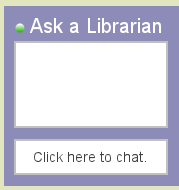Information Update - Spring 1997
Evaluating Web Sites
- In his presentation at the Pennsylvania Library Association 1996 Conference, Boyd Collins, Librarian, Rutgers University, stressed the need for users to evaluate critically material found on the World Wide Web. Mr. Collins has substantial experience with these issues and has collaborated with other librarians on the InfoFilter Project which reviews Web sites. These reviews appear on their home page at http://www.usc.edu/users/help/flick/InfoFilter/reviews.html.
-
- It is impossible for the InfoFilter Project, or any other service, to evaluate all Web sites given the rate at which new sites appear. For this reason, and because anyone can publish on the WWW without being edited or reviewed, users, especially students, should [earn to evaluate the material they find. The criteria used by the InfoFilter Project provide a useful guide for such evaluation. Their six criteria are:
- Content. How up-to-date is the information? Does the owner of the Web site provide revisions and are these noted? Does the site cover what it claims? This varies by the purpose of the site, whether it is to inform (education or government), advocate (organization or personal), or advertise (commercial), Jan Alexander and Marsha Tate's "Evaluation of Web Resources" elaborates on the different types of Web sites and provides criteria to assess each (http://www.widener.edu~withers/webeval.html).
- Authority. Is the authority of the site's sponsor identifiable? If it. is an individual. does the person list his or her occupation, experience or education? Is it sponsored by a university, company or government? Does this affect the information presented?
- Organization. How is the information presented? Is it easy to find what you are looking (-or? Are appropriate links to other resources provided?
- Searchability. Does the site allow you to conduct a search within the site? If not, is the organization and location of its contents well documented?
- Graphic Design. Do the graphics enhance or distract from the purpose of the site?
- Innovative Use of the Medium. Does it take advantage of the interactive nature of the Web? If there is a print equivalent, how does the web site enhance it?
Additional sites that provide evaluation guidelines include Ann Scholz's "Evaluating World Wide Web Information" (http://thorplus.lib.purdue.edu/rese...lasses/gs175/3gsl75/evaluation.html) and Esther Grassian's "Thinking Critically about World Wide Web Resources" (http://www.ucla.edu/campus/computing/bruinonline/trainer/critical.html). -
- Search engines (Excite, Alta Vista, Lycos) and publications (Net Magazine) also provide evaluations, although they sometimes fail to identify the criteria used.
-
- The World Wide Web provides a forum for individuals and institutions to present information without restrictions of editorial boards or review: Consequently the quality of that information varies. The InfoFilter Project provides one set of criteria to help users evaluate the information found on the Web.

